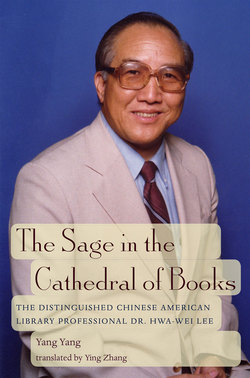Читать книгу The Sage in the Cathedral of Books - Yang Sun Yang - Страница 11
На сайте Литреса книга снята с продажи.
ОглавлениеFOREWORD V
LATE IN 2007, I was invited to apply for the dean of Libraries vacancy at Ohio University. As I had researched the history of the library and asked senior colleagues about what they knew about Ohio University and the Vernon R. Alden Library, one name always came up: Hwa-Wei Lee. Everyone within the Association of Research Libraries (ARL) community knew him. Hwa-Wei, they told me, helped form OhioLINK, brought modern library technology and practices to Ohio University, earned entrance into ARL for Ohio University, amassed nationally recognized international collections, created the Shao You-Bao Overseas Chinese Documentation and Research Center, and even built a high-density storage facility that now carries his name. It was hardly surprising everyone within ARL spoke so admiringly of Hwa-Wei. And it was, frankly, an intimidating legacy for a first-time dean to follow.
Not long after coming to Ohio University, a note came from Hwa-Wei asking if we could meet for dinner. He and his wife Mary were planning a trip from their home in Florida to Ohio, and they planned a stop in Athens. And, so, on a warm July evening my wife and I met Hwa-Wei and Mary for the first time. In a small, charming restaurant tucked in the Athens countryside, we talked for hours. Instead of the distant and intimidating figure I was expecting, Hwa-Wei proved to be friendly, unassuming, and helpful. It was the first of many long conversations Hwa-Wei, Mary, and I would have. Not only were their help, perspective, and advice invaluable, the scope of all they had done for Ohio University began to become apparent.
But it wasn’t until I traveled to Hong Kong, China, and Japan that I began to understand the extent of their contributions and kindness. At alumni events, library conferences, and university campuses across Asia, I met dozens of former Ohio University students, visitors, and librarians who had benefited from Hwa-Wei and Mary’s generosity. So many of our international alums, who had stayed with Hwa-Wei and Mary for weeks, depended upon them for advice and looked to them as a connection to their homes that were so far away. Librarians told me of how they would visit Ohio University—sometimes for months and without adequate funding—to learn the best practices and the latest technologies in libraries. Many of those librarians are leaders in academic libraries throughout Asia today. It’s hard to exaggerate, then, the influence Hwa-Wei has had on modern Asian librarianship.
His many accomplishments at Ohio University, and then at the Library of Congress, stand for themselves. More importantly, though, are the number of lives he and Mary have touched. They are both testaments to how libraries are much more than collections of books, and the power each of us has to change lives through our generosity.
Scott Seaman
Dean, Ohio University Libraries
Ohio University
Athens, Ohio, U.S.A.
